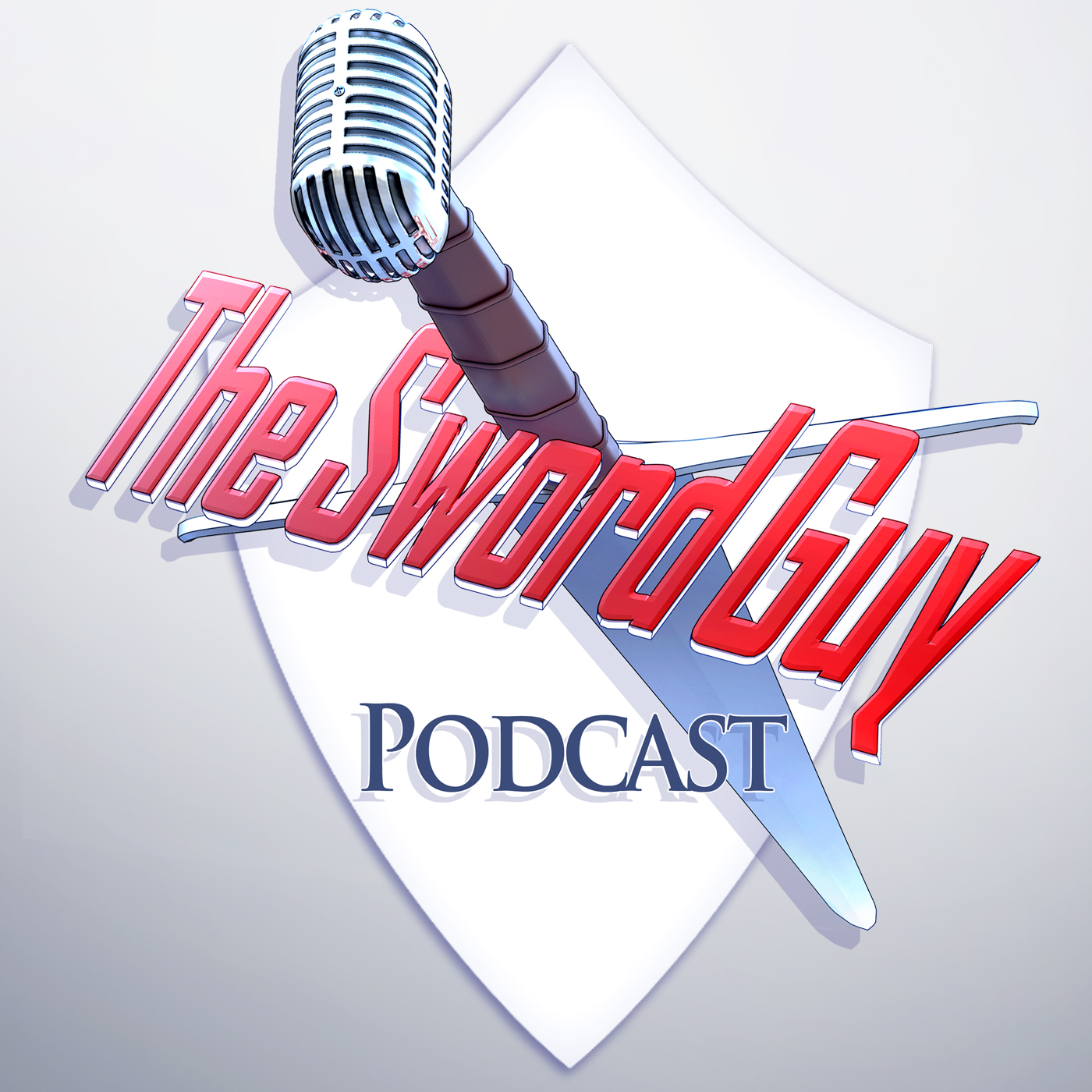Episodes
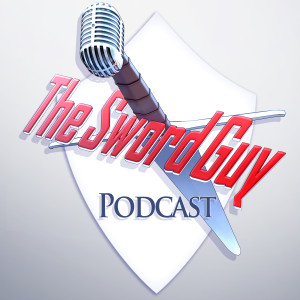
Friday Jul 02, 2021
Lightsaber Twirling with Jill Bearup
Friday Jul 02, 2021
Friday Jul 02, 2021
The Sword Guy Podcast episode 58

For transcriptions and more detailed shownotes, please go to https://swordschool.com/podcast/lightsaber-twirling-episode58/
To support the show, come join the Patrons at https://www.patreon.com/theswordguy
Jill Bearup is a stage combatant, YouTuber and a lightsaber twirler. I first came across her work through her YouTube channel critiquing swordfights in TV and movies, which is here: https://www.youtube.com/channel/UCRrvZqCL1YsqRA8IpXrhYQQ. Jill loves pretending to fight people on stage and screen and her videos cover how a good fight can add to the story being told, and also, in case you need it, how to sword fight in a dress.
You can find her online at www.patreon.dot.com/JillBearup and her website is www.jillbearup.com.
In our conversation we talk a lot about Star Wars and lightsabers. The lightsabers Jill has are from Saberzone www.saberzonecosplay.com.
To watch the Kylo Ren and Rey Throne Room fight with all that random twirling from the Red Guards, see https://www.youtube.com/watch?v=D4cugJ7JzvM
We don’t just talk about Star Wars, we discuss other swordfights on the big and small screen. This is a favourite of ours; the final duel in Rob Roy, with Liam Neeson and Tim Roth: https://www.youtube.com/watch?v=ERmM5l2ceoY. It’s not all good though, we also talk about the sword fighting in Game of Thrones.
You might be interested in Jill’s YouTube channel for hair tutorials, where she recreates hair styles from film, including Princess Leia’s braids: https://www.youtube.com/channel/UCSCElWJIZPQnf4_ZuGpI8RA

Wednesday Jun 30, 2021
Monthly Challenge: breathe better in July
Wednesday Jun 30, 2021
Wednesday Jun 30, 2021
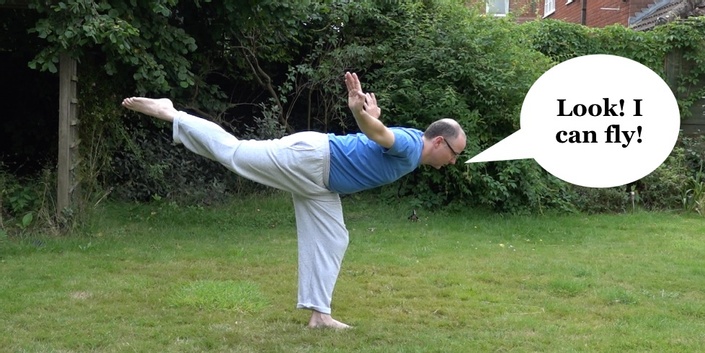
For transcriptions and more detailed shownotes, please go to https://swordschool.com/podcast/monthly-challenge-breathe-better-in-july-the-sword-guy-episode-57/
To support the show, come join the Patrons at https://www.patreon.com/theswordguy
Your monthly challenge for July 2021: breathe better.
For more on this subject, please see The Theory and Practice of Historical Martial Arts, also available as an audiobook read by Kelley Costigan. Or the try my online course, Fundamentals: Breathing, which covers much of my breathing practice. It’s included with the monthly subscription package, and with the Solo Training course. The first class is available as part of my free Human Maintenance course.

Friday Jun 25, 2021
Persian Martial Arts with Manouchehr Khorasani
Friday Jun 25, 2021
Friday Jun 25, 2021
Episode 56
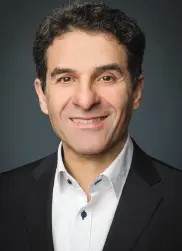
For transcriptions and more detailed shownotes, please go to https://swordschool.com/podcast/persian-martial-arts-episode56/
To support the show, come join the Patrons at https://www.patreon.com/theswordguy
Manouchehr Moshtagh Khorasani is a Frankfurt-based museum analyst, university professor, author of many books and over one hundred and eighty articles on the historical martial arts of Iran. He is a highly skilled martial artist and is currently waiting for the pandemic to be over so he can get his third Dan black belt in Kyokushin Karate.
Manouchehr is a highly skilled wrestler, and in this episode we talk about the importance of wrestling in Iranian culture, and how it is an integral part of his Razmafzar school of Iranian/Persian martial arts, which also uses swords, shields, knives, spears and bows.
https://youtu.be/Q-jOZRoOyR8 Here is a video of some of the weapons used in the Razmafzar system.
You can find Manouchehr online at https://www.moshtaghkhorasani.com/, where you will find a really extraordinary range of articles and resources on Persian martial arts. His books include The Lexicon of Arms and Armour from Iran; Persian Archery and Swordsmanship: Historical Martial Arts of Iran; and Arms and Armor from Iran: The Bronze Age to the End of the Qajar Period.
There are lots of videos of Razmafzar in action on Manouchehr’s Facebook and Instagram pages, and there is absolutely loads of content on RazmafzarTV’s YouTube channel, including both Persian weapons, armour, archery and martial arts, and also Manouchehr’s swimming, solo training and Kyokushin katas, which we talk about in the second half of the episode.

Friday Jun 18, 2021
Shakespeare and Silver with Ben Crystal
Friday Jun 18, 2021
Friday Jun 18, 2021
The Sword Guy Podcast episode 55

For transcriptions and more detailed shownotes, please go to https://swordschool.com/podcast/shakespeare-and-silver-epsiode55/
To support the show, come join the Patrons at https://www.patreon.com/theswordguy
Ben Crystal is an actor, author, producer, and explorer of original practices in Shakespeare rehearsal and production. In this episode we talk about Ben’s work in exploring how actors would have rehearsed, staged, and performed Shakespeare’s plays in the 16th century, and how the original rhymes and pronunciation would have sounded. It makes for a completely different experience to what we think of as “Shakespearean” in modern times. Even if you aren’t into Shakespeare this is a fascinating conversation about theatre, memory, language, and of course, swords.
Which leads us on to George Silver. Find out what Ben thinks of Silver and whether he would have wanted to go to the pub with him. For those of you unaware of our project, in 1599 George Silver published his Paradoxes of Defence, offering a window into the Tudor and medieval martial arts as practiced in England. I am bringing that book to life in glorious audio, both in modern pronunciation (narrated by Jonathan Hartman), and Original Pronunciation (narrated by Ben Crystal). Renowned historical harpist Andrew Lawrence-King is providing the musical punctuation. You can support the project here: www.guywindsor.net/silver and listen to a sample of Ben’s original pronunciation towards the end of the episode here: https://guywindsor.net/2021/05/paradoxes-of-defence-in-audio/.
Visit Ben Crystal’s website at www.bencrystal.com and find him on Twitter @bencrystal.


Friday Jun 11, 2021
Movement Matters with Katy Bowman
Friday Jun 11, 2021
Friday Jun 11, 2021
The Sword Guy Podcast, episode 54
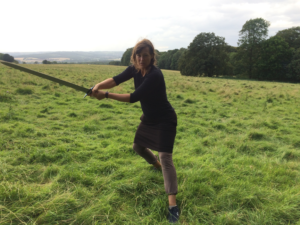
For transcriptions and more detailed shownotes, please go to https://swordschool.com/podcast/movement-matters-with-katy-bowman/
To support the show, come join the Patrons at https://www.patreon.com/theswordguy
Bestselling author, speaker, and a leader in the Movement movement, biomechanist Katy Bowman has been changing the way we move and think about our need for movement. Her eight books, including the groundbreaking “Move Your DNA” and “Movement Matters” have been translated into more than a dozen languages worldwide. Bowman teaches movement globally and speaks about sedentarism and movement ecology to academic and scientific audiences. Her work has been featured in diverse media such as the Today Show, CBC Radio One, the Seattle Times, and Good Housekeeping. One of Maria Shriver’s “Architects of Change” and an America Walks “Woman of the Walking Movement”, Katy has worked with companies like Patagonia, Nike and Google as well as a wide range of non-profits and other communities, sharing her “move more, move more body parts, move more for what you need” message. Her movement education company, Nutritious Movement, is based in Washington State, where she lives with her family.
In our conversation we talk about form, feet, injuries, and Jess Finley’s ‘hooky’ acromion process (it’s part of your shoulder). When you use swords, or do any other sport, the movements - or lack of - that you do all of the rest of the time when you are not doing swords create your ability to move freely and effectively with a sword in your hand. What is your body doing when it is not doing swords?
We mention Ruth Goodman’s book, How to be a Tudor. You can find out more here: https://www.penguin.co.uk/books/287/287072/how-to-be-a-tudor/9780241973714.html and listen to our podcast episode here: https://guywindsor.net/2021/04/fire-and-cauldrons-episode44/
If the section on barefoot shoes inspires you, check out Freet shoes https://freetbarefoot.com Use this code at checkout: THESWORDGUY10 to get 10% off- and if you do, I’ll also get a small commission. Yay!
The author mentioned when we are talking about Finland is Robert Holdstock, the Mythago Wood series.
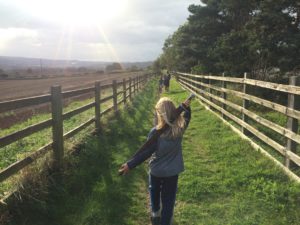
We also discuss sedentary culture, what it’s doing to us and our kids, and how we might improve our environment to make movement more likely. Human movement is at an all-time low and our children are currently facing both a movement and nature deficiency, with physical, mental and environmental consequences. The good news is, while the problem feels massive, the solution is quite simple…and fun! Katy’s forthcoming book, “Grow Wild: The Whole-Child, Whole-Family, Nature-Rich Guide to Moving More” is out in the UK on 24th June, SRP £24.99, published by Propriometrics Press; distributed by Chelsea Green Publishing.
On Bookshop UK: https://uk.bookshop.org/books/grow-wild-the-whole-child-whole-family-nature-rich-guide-to-moving-more/9781943370160
Katy’s web/social media links:
https://www.nutritiousmovement.com
https://www.facebook.com/NutritiousMovement/
https://www.instagram.com/nutritiousmovement/

Friday Jun 04, 2021
Turning the tables, with Guy and Jess
Friday Jun 04, 2021
Friday Jun 04, 2021
The Sword Guy Podcast, episode 53
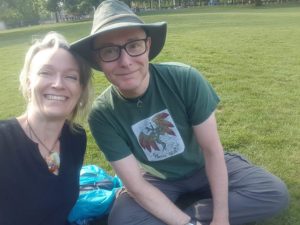
For transcriptions and more detailed shownotes, please go to https://swordschool.com/podcast/turning-the-tables-episode53/
To support the show, come join the Patrons at https://www.patreon.com/theswordguy
To celebrate a whole year of The Sword Guy Podcast, we are going right back to where it all began, with Jess Finley. Except this time the tables are turned and it’s Jess interviewing me! In our wide-ranging conversation we talk about my history of antiques restoration and starting a sword school. We also talk in depth about flipping hierarchies on their head to give students what they want, and how to deal with those rare students who roll their eyes at our teaching. Jess also gets to ask the now very familiar question: "What’s the best idea you have never acted upon?”

Tuesday Jun 01, 2021
Challenge of the Month: meditate in June
Tuesday Jun 01, 2021
Tuesday Jun 01, 2021
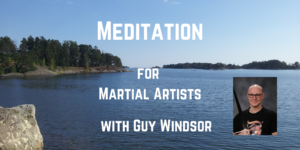
For transcriptions and more detailed shownotes, please go to https://swordschool.com/podcast/challenge-of-the-month-meditate-in-june/
To support the show, come join the Patrons at https://www.patreon.com/theswordguy
For a free meditation class, see: https://swordschool.teachable.com/p/free-courses-human-maintenance-longsword-rapier
And check out the Paradoxes of Defence audiobook here: guywindsor.net/silver

Friday May 28, 2021
The Sparkle School, with Claire Wemyss
Friday May 28, 2021
Friday May 28, 2021
Episode 52
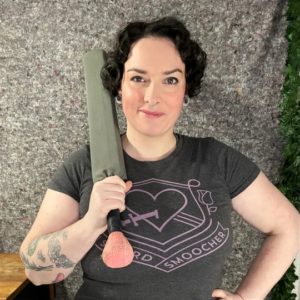
For transcriptions and more detailed shownotes, please go to https://swordschool.com/podcast/the-sparkle-school-episode52/
To support the show, come join the Patrons at https://www.patreon.com/theswordguy
Claire Wemyss lives in Vancouver and is a coach, educator, and co-founder of Kunst des Funkelns, which focusses on the martial arts of medieval Germany and runs from Valkyrie Western Martial Arts Assembly. In this episode, Claire describes how she and her training partner Jon Mills came up with the name of Kunst des Funkelns, her love for the Messer, and why play-based learning is so important.
Claire is also an ADHD coach, and towards the end of our conversation, she describes how coaches can best work with neurodivergent students, and how neurodivergent students themselves can self-advocate to ensure they get the most out of the learning environment.
Useful links:
- Kunst des Funkelns on Instagram.
- I said in the episode I would post a link to Foametheus Forge, but they don’t appear to be in business any more.
- Episode 5 with Kaja Sadowski
- Episode 23 with Da’Mon Stith

Friday May 21, 2021
Mines and Mimeographs, with Steven Muhlberger
Friday May 21, 2021
Friday May 21, 2021
Episode 51

For transcriptions and more detailed shownotes, please go to https://swordschool.com/podcast/mines-and-mimeographs-episode51/
To support the show, come join the Patrons at https://www.patreon.com/theswordguy
Professor Steven Muhlberger is an absolute legend in the historical martial arts community and is a 50 year veteran of the SCA. In this episode we talk about the very early days of the SCA, and how newsletters were vital in spreading the word.
His books are foundationally important for anyone who is studying medieval martial arts, and they include Deeds of Arms, Jousts and Tournaments, Formal Combat in the Fourteenth Century, Royal Jousts, Murder, Rape and Treason: Judicial Combat in the Late Middle Ages and all sorts of other titles too. You can find more information at http://smuhlberger.weebly.com/
As you can see from the list of book titles, Steven is something of an expert in chivalric combat in the 14th century, and in our conversation he describes some that took place in France, and his favourite story of the Duke of Bourbon fighting some English roughnecks in a tiny mine, which led to a great result for all involved.
Read more from Steven in Muhlberger's World History blog: http://smuhlberger.blogspot.com/

Wednesday May 19, 2021
Silver’s Paradoxes- in glorious audio!
Wednesday May 19, 2021
Wednesday May 19, 2021

For transcriptions and more detailed shownotes, please go to https://swordschool.com/podcast/paradoxes-of-defence-in-audio/
To support the show, come join the Patrons at https://www.patreon.com/theswordguy
In 1599 George Silver, gentleman, published his Paradoxes of Defence, which lambastes the outlandish (i.e. foreign) Italian rapier fencing that was becoming popular in England, and offers an extraordinary window into the medieval martial arts that the rapier was superceding.
Whatever you think about Silver, or rapier fencing, his book is simply essential reading for all historical martial artists. It is one of the few historical fencing sources that doesn't rely on images, so it struck me that it would make an excellent audiobook. Why not listen to Silver in the car, while cooking, doing housework, or whatever else?
And, why not have him read not only in our modern pronunciation, but also in Original pronunciation?
I hired Jonathan Hartman to do a modern narration, and Ben Crystal to do the Original pronunciation. Renowned historical harpist Andrew Lawrence-King is providing the musical punctuation.
This project provides Silver's work in an accessible format, and an unmissable opportunity to compare and contrast the two versions.
If you are a sword person, a historian, a linguist, re-enactor or a Shakespeare fan, this is for you.
I've put together a crowdfunding campaign to help raise funds to pay for the rest of the work. If you think this is a good idea, please support it!

